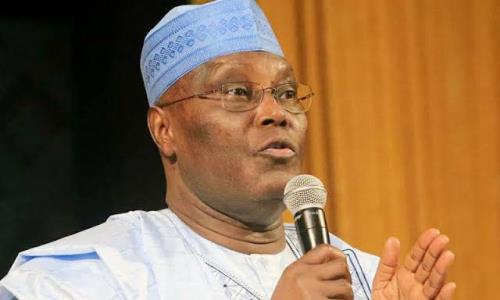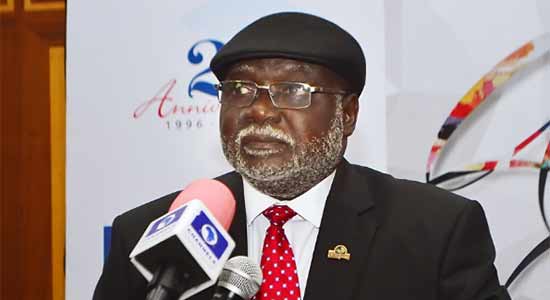COVER STORY NIGERIA 2023 14/09/2022
2023: Atiku Unfolds Economic Blueprint

Presidential candidate of Peoples Democratic Party (PDP), Atiku Abubakar, yesterday, said he would resuscitate Nigeria’s ailing economy by launching a $10 billion Economic Stimulus Fund within his first 100 days in office, if he wins the 2023 presidential election. Atiku said the fund would prioritise support to micro, small and medium scale enterprises (MSMEs) that offer greatest opportunity for inclusive economic growth.
The PDP presidential candidate spoke in Lagos during the “Lagos Chamber of Commerce and Industry (LCCI) Presidential Economic Agenda Forum for the PDP.” He laid out his economic plan to salvage the country’s economic fortunes before members of Nigeria’s organised private sector.
Atiku also said he would rather privatise Nigeria’s dilapidated refineries rather than spend $1.55 billion on their revitalisation. He added that he would stop all fiscal support to ailing public enterprises and “over the medium term, I will propose legislation for the removal of the entire electricity value chain from the exclusive list and give states the power to generate, transmit and distribute electricity for themselves.”
Atiku assured the captains of industry of a warm handshake, saying he would listen to the private sector more, restore investors’ confidence in the Nigerian economy, break the jinx of infrastructure finance, declare a state of emergency in the power sector, undertake far-reaching fiscal restructuring that would improve liquidity in the economy and stimulate growth, create jobs, wage war against hunger as well as ensure that over the medium term, recurrent expenditure should not exceed 45 per cent of the budget
Atiku said, “Today, I will speak on the strategic steps that I will take to build the economy of our dreams and foster bondless prosperity for all Nigerians. Poverty reduction shall be the centrepiece of our economic development agenda and economic performance shall henceforth be measured by the number of jobs created and the number of people lifted out of poverty.
“Within the first 100 days of in office, I will create an Economic Stimulus Fund with an initial investment capacity of $10 billion to prioritise support to MSMEs across all the economic sectors, as they offer the greatest opportunities for achieving inclusive growth.
“I will undertake far-reaching fiscal restructuring to improve liquidity as well as the management of our fiscal resources in five bold steps.
“First, undertake an immediate review of government spending with a view to eliminating all leakages arising from subsidy payments. With its current precarious fiscal position and daunting development challenges, can Nigeria really afford to forego critical investments in education, health, security, etc. and channel scarce resources to subsidising the lifestyles of its elite?
“Second, stop all fiscal support to ailing state-owned enterprises. As with subsidy payments, by holding unto these underperforming enterprises, Nigeria is sacrificing investments in critical areas, including water, sanitation, and rural infrastructure. For example, the first phase in the rehabilitation of Nigeria’s refineries is expected to gulp $1.55 billion! I will sell of them.
“Third, take steps to improve spending efficiency by gradual reduction of government recurrent expenditures. Over the medium term, recurrent expenditures should not exceed 45 per cent of the budget.
‘Finally, focus on non-debt financing by promoting a private-sector led infrastructure development fund for the financing and delivery of key infrastructure projects.”
He added that his administration would be different, as it would support “the private sector to drive growth. We will establish strong partnership in investing in infrastructure, in creating jobs and income and in the fight against poverty. We will listen to the private sector more.”
The PDP candidate pointed out that the Nigerian economy was presently crawling rather than growing and that the country was broke and more Nigerians are getting poorer, more miserable today than in 2015, while capital has taken a flight.
Atiku made it clear that his administration would, “allow the Central Bank of Nigeria the independence to pursue its mandate but ensure that such policies are not detrimental to Nigeria’s quest for FDI and Nigeria’s long-term growth.”
He also promised to take “immediate steps to slow down the rate of debt accumulation by promoting more Public Private Partnerships in critical infrastructure funding and identifying more innovative funding options.
“Our economy is bleak and our challenges daunting. There is no doubt about that. No one should downplay the enormity of the tasks ahead. Indeed, I cannot think of a more daunting challenge than restoring confidence in the future of Nigeria as a dynamic economy and a stable democracy.”
President of the LCCI, Dr. Michael Oluwale-Cole, in his welcome address, stated that though the chamber was non-partisan, it was interested in the economic agenda of the candidates and their plans to make a better Nigeria in the next dispensation.
Oluwale-Cole said, “The chamber is aware of the overshadowing effect of politics over economics in managing the Nigerian economy and would, therefore, wish to contribute to the setting of a new economic order that can take our economy from the doldrums.
“New policy directions, institutional reforms, and sound governance are critical to creating a new economic order in Nigeria. This is why we are gathered here today.
“For the past 16 years LCCI has organised this session in every election cycle. This is a part of its public policy advocacy to provide a first-hand opportunity for presidential candidates of the leading political parties to speak to the organised private sector on their economic blueprint for Nigeria.
“All patriotic Nigerians would like to know the plans and intentions of a future president, and this will most likely enhance the choices people make at the polls.”



